Home Tags Posts tagged with "ebola outbreak"
ebola outbreak
President Barack Obama will announce today his plans to send 3,000 troops to Liberia to help fight the Ebola virus, US officials say.
It is understood the US military will oversee building new treatment centers and help train medical staff.
There has been criticism of the slow international response to the Ebola epidemic in West Africa.
Sierra Leone, Liberia and Guinea are the worst-hit countries.
The Ebola outbreak has killed more than 2,400 people.
More than half of those killed by the virus have been in Liberia. The World Health Organization (WHO) warned recently that the country could see thousands of more cases.
UN officials will discuss the international response to the outbreak at a meeting in Geneva.

Barack Obama is planning to send 3,000 troops to Liberia to help fight the Ebola virus
US officials said the aim of the country’s anti-Ebola initiative is to:
- Train up to 500 healthcare workers a week
- Construct 17 healthcare facilities, each with about 100 beds
- Establish a joint command based in Monrovia, Liberia, to co-ordinate between US and international relief efforts
- Distribute home healthcare kits to thousands of households
- Conduct a home and community-based campaign to train local people in how to handle patients
Liberian President Ellen Johnson Sirleaf has appealed directly to Barack Obama for help in tackling the outbreak.
Several disease experts have welcomed the US plan, though some also question its focus on Liberia.
“We should see all of West Africa now as one big outbreak,” says Michael Osterholm, director of the Center for Infectious Disease Research and Policy at the University of Minnesota, quoted in The New York Times.
“It’s very clear we have to deal with all the areas with Ebola.”
Ebola spreads between humans by direct contact with infected blood, bodily fluids or organs, or indirectly through contact with contaminated environments.
[youtube 9dL19B32rxU 650]
According to the World Health Organization, the Ebola outbreak in West Africa has killed 2,288 people, with half of them dying in the last three weeks.
The WHO said that 47% of the deaths and 49% of the total 4,269 cases had come in the 21 days leading up to September 6.
It also warned that thousands more cases could occur in Liberia, which has had the most fatalities.
The Ebola outbreak, which was first reported in Guinea in March this year, has also spread to Sierra Leone and Nigeria.
In Nigeria, eight people have died out of 21 cases, while one case of Ebola has been confirmed in Senegal, the WHO said in its latest update.

The Ebola outbreak in West Africa has killed 2,288 people, with half of them dying in the last three weeks
On Monday, the agency called on organizations combating the outbreak in Liberia to scale up efforts to control the outbreak “three-to-four fold”.
Ebola spreads between humans by direct contact with infected blood, bodily fluids or organs, or indirectly through contact with contaminated environments.
However, the WHO says conventional means of controlling the outbreak, which include avoiding close physical contact with those infected and wearing personal protective equipment, were not working well in Liberia.
Meanwhile, the US says it will help the African Union mobilize 100 African health workers to the region and contribute an additional $10 million in funds to deal with the outbreak.
The announcement comes as a fourth US aid worker infected with the deadly virus was transported to a hospital in Atlanta for treatment.
Two other aid workers who were treated at the same hospital have since recovered from an Ebola infection.
[youtube NKLtXDfdWX0 650]
Sierra Leone has announced a four-day lockdown to try to tackle the Ebola disease.
According to a senior official, from 18 to 21 September people will not be allowed to leave their homes.
The aim of the move is to allow health workers to isolate new cases to prevent the disease from spreading further.
The Ebola outbreak has killed about 2,100 people in Sierra Leone, Liberia, Guinea and Nigeria in recent months.
The World Health Organization (WHO) announced on September 5 that health workers could be given vaccines as from November, when safety tests are completed.

Sierra Leone has announced a four-day lockdown to try to tackle the Ebola disease
More than 20 health workers have lost their lives to the virus in Sierra Leone since the start of the outbreak in March.
Last month Liberia sealed off a large slum in the capital, Monrovia, for more than a week in an attempt to contain the virus.
The disease infects humans through close contact with infected animals, including chimpanzees, fruit bats and forest antelope.
It then spreads between humans by direct contact with infected blood, bodily fluids or organs, or indirectly through contact with contaminated environments.
A presidential adviser described the measure as aggressive but argued that it was necessary to deal with the spread of Ebola.
Meanwhile, officials in Nigeria have decided to reopen schools in the country from September 22.
They were closed as a precaution to prevent the spread of the virus.
On September 5, the WHO announced that the blood of patients who recovered from Ebola should be used to treat others.
People produce antibodies in the blood in an attempt to fight off an Ebola infection. The antibodies may be able to help a sick patient’s immune system if they are transferred.
However, large scale data on the effectiveness of the therapy is lacking.
More than 1,900 people have now died in West Africa’s Ebola outbreak, the World Health Organization (WHO) says.
WHO head Margaret Chan said there were 3,500 confirmed or probable cases in Guinea, Sierra Leone and Liberia.
“The outbreaks are racing ahead of the control efforts in these countries,” she said.
On September 4, the WHO is holding a meeting to examine the most promising treatments and to discuss how to fast track their testing and production.
Disease control experts, medical researchers, officials from affected countries, and specialists in medical ethics will all be represented at the meeting in Geneva.
The WHO has previously warned that more than 20,000 people could be infected before the outbreak of the virus is brought under control.
Margaret Chan described the outbreak as “the largest and most severe and most complex we have ever seen”.
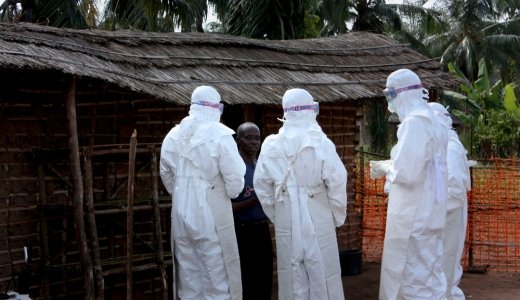
More than 1,900 people have now died in West Africa’s Ebola outbreak
“No one, even outbreak responders with experience dating back to 1976, to 1995, people that were directly involved with those outbreaks, none of them have ever seen anything like it,” she said.
At least 40% of the deaths have occurred in three weeks leading up to September 3, the WHO says.
Yesterday Nigeria reported two further cases in the city of Port Harcourt.
There had previously only been one case outside the city of Lagos, where five people have died from the virus.
“The outbreak of Ebola virus disease in Port Harcourt has the potential to grow larger and spread faster than the one in Lagos,” the WHO warned.
Also on September 3, the first British person to contract Ebola during the outbreak was discharged from hospital after making a full recovery.
On September 2, medical charity Medecins Sans Frontieres (MSF) warned that a global military intervention was needed to combat the outbreak.
MSF condemned the global response so far as “lethally inadequate” and said the world was “losing the battle” to contain the outbreak.
It has called for military and civilian teams capable of dealing with a biological disaster to be deployed immediately, as well as for more field hospitals with isolation wards to be set up, trained healthcare workers to be sent to the region and air support to move patients and medics across West Africa.
[youtube kzN-fUIByNY 650]
The first human trials for an Ebola vaccine have begun in Maryland.
Researchers are studying how human immune systems respond to the vaccine.
Twenty healthy adult volunteers are being tested at the National Institutes of Health (NIH) in Maryland.
The trial has been brought forward amid an outbreak of the Ebola disease in West Africa that has killed at least 1,500.
No volunteers will be infected with the Ebola virus but the vaccine has performed well in primate trials.
There is no cure for Ebola but a separate experimental drug, ZMapp, was 100% effective in studies on monkeys, according to researchers who published their data in Nature last week.
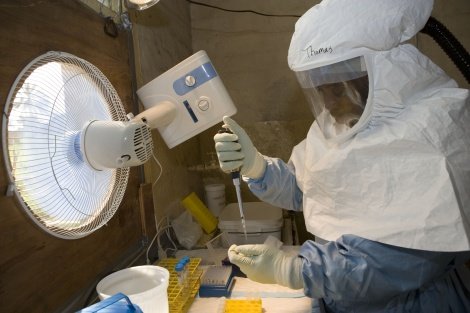
The first human trials for an Ebola vaccine have begun in Maryland
ZMapp has not been officially studied in humans, but it was used on seven people infected with Ebola in West Africa, mostly health workers.
Two of them later died and it is unclear if the drug helped the others to recover. The fatality rate during this outbreak has been about 50%, according to the World Health Organization (WHO).
At least 3,000 people have been infected with the virus. On August 29, a fifth country, Senegal, had its first confirmed case.
WHO has warned it could get much worse and infect more than 20,000 people.
“There is an urgent need for a protective Ebola vaccine, and it is important to establish that a vaccine is safe and spurs the immune system to react in a way necessary to protect against infection,” said Dr. Anthony Fauci, director of the National Institute of Allergy and Infectious Diseases, which helped develop the drug.
Researchers in Bethesda, Maryland, will be looking for any adverse reactions and how each volunteer’s immune system responds to the vaccine.
NIH is also partnering internationally with the Wellcome Trust and others for a similar trial in the UK, the Gambia and Mali.
According to the World Health Organization (WHO), the deadly Ebola outbreak in West Africa could infect more than 20,000 people before it is brought under control.
The WHO said the number of cases could already be four times higher than the 3,000 currently registered.
It also called on airlines to resume “vital” flights across the region, saying travel bans were threatening efforts to beat the epidemic.
So far, 1,552 people in Liberia, Sierra Leone, Guinea and Nigeria have died.
Announcing a WHO action plan to deal with the outbreak, Bruce Aylward said “the actual number of cases may be 2-4 fold higher than that currently reported” in some areas.
The WHO assistant director-general said the possibility of 20,000 cases “is a scale that I think has not ever been anticipated in terms of an Ebola outbreak”.
“That’s not saying we expect 20,000… but we have got to have a system in place that we can deal with robust numbers,” he added.
The WHO plan calls for $489 million to be spent over the next nine months and requires 750 international workers and 12,000 national workers across West Africa.
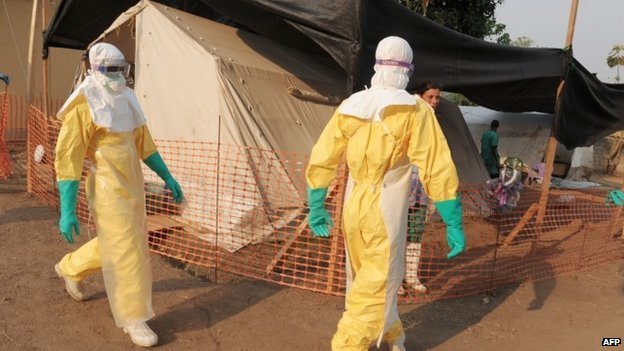
The Ebola outbreak in West Africa could infect more than 20,000 people before it is brought under control (photo AFP)
On August 28, Nigeria confirmed its first Ebola death outside Lagos, with an infected doctor in the oil hub of Port Harcourt dying from the disease.
Operations have not yet been affected in Africa’s biggest oil producer, but a spokesman for Shell’s Nigerian subsidiary said they were “monitoring the Ebola outbreak very closely”.
Health ministers from across West Africa are meeting in Ghana at an extraordinary meeting of the Economic Community of West African States (ECOWAS) to discuss how to prevent the virus from spreading further.
Officials at the ECOWAS session backed the WHO’s call for flight bans to be ended and called for states to reopen their borders to make it easier for health workers to access affected areas.
Earlier Bruce Aylward insisted bans on travel and trade would not stop the spread of Ebola, saying they were “more likely to compromise the ability to respond”.
Despite rumors to the contrary, the Ebola virus is not airborne and is spread by humans coming into contact with bodily fluids, such as sweat and blood, from those infected with virus.
Medical agencies in West Africa are struggling to cope with an increasing number of cases and growing hostility from communities in certain affected areas.
Efforts to prevent the virus spreading are unlikely to see any results given that most treatment centers are already operating at full capacity.
Meanwhile, British medical charity Wellcome Trust and pharmaceuticals giant GlaxoSmithKline (GSK) said safety trials on an experimental Ebola vaccine are being fast-tracked.
GSK says it plans to build up a stockpile of up to 10,000 doses for emergency deployment if results from the trials, which could begin as soon as next month, are good.
[youtube Os3mtqbG2u4 650]
Ebola virus disease (EVD), formerly known as Ebola hemorrhagic fever is a severe, often fatal illness in humans.
Ebola first appeared in 1976 in 2 simultaneous outbreaks, in Nzara, Sudan, and in Yambuku, Democratic Republic of Congo. The latter was in a village situated near the Ebola River, from which the disease takes its name.
Symptoms start two days to three weeks after contracting the virus, with a fever, sore throat, muscle pain and headaches. Typically, vomiting, diarrhea and rash follow, along with decreased functioning of the liver and kidneys. Around this time, affected people may begin to bleed both within the body and externally.
According to the World Health Organization (WHO), EVD outbreaks have a case fatality rate of up to 90% and occur primarily in remote villages in Central and West Africa, near tropical rainforests.
Ebola is one of the world’s most deadly viruses but is not airborne, so cannot be caught like flu, the virus is transmitted to people from wild animals and spreads in the human population through human-to-human transmission.
Fruit bats of the Pteropodidae family are considered to be the natural host of the Ebola virus.
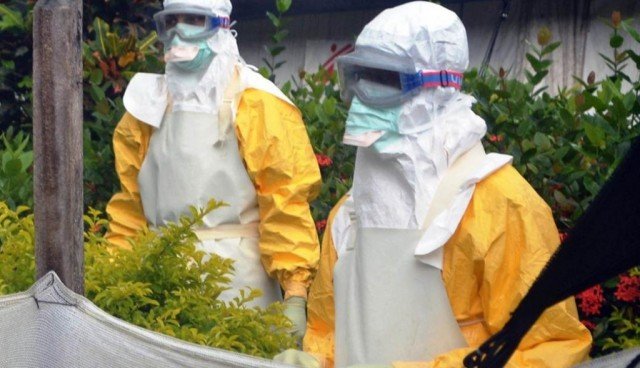
The Ebola outbreaks have a case fatality rate of up to 90 percent and occur primarily in remote villages in Central and West Africa, near tropical rainforest (photo Getty Images)
Severely ill patients require intensive supportive care. No licensed specific treatment or vaccine is available for use in people or animals.
Doctors say avoiding the Ebola virus should be quite easy if you follow these top tips:
Wash your hands regularly with soap and clean water – and use clean towels to dry them. This can be difficult in slum and rural areas where there is not always direct access to clean water – but it is an effective way to kill the virus. Ordinary soap is all that’s needed. Shaking hands should also generally be avoided, because Ebola spreads quickly when people come into contact with an infected person’s body fluids and symptoms take can take a while to show. Other forms of greeting are being encouraged.
No touching – if you suspect someone of having Ebola, do not touch them. This may seem cruel when you see a loved one in pain and you want to hug and nurse them, but body fluids – urine and stools, vomit, blood, nasal mucus, saliva, tears etc. – can all pass on the virus. An infected person’s symptoms include fever, muscle and joint pain, sore throat, headache and fatigue – followed by nausea, vomiting and diarrhea, which may include blood. Encourage them to seek help from a medical professional or health centre as soon as possible. It is also advisable not to touch the clothes or bedclothes of Ebola patients. Medecins Sans Frontieres advises that such sheets and even mattresses be burnt.
Avoid dead bodies – if you think someone has died from Ebola, do not touch their body, even as part of a burial ceremony. When someone has died, you can still catch Ebola from their body as it ejects fluids that make it even more contagious than that of a sick person. Organize for a specialized team to deal with the body as quickly as possible as it is risky to leave a dead body for any length of time in a cramped living area.
Avoid bushmeat – hunting, touching and eating bushmeat such as bats, monkeys and chimpanzees, as scientists believe this is how the virus was first transmitted to humans. Even if a certain wild animal is a delicacy in your region, avoid it as its meat or blood may be contaminated. Make sure all food is cooked properly.
Don’t panic – spreading rumors increases fear. Do not be scared of health workers – they are there to help and a clinic is the best place for a person to recover – they will be rehydrated and receive pain relief. About half of the people infected in the current outbreak have died. There have been cases of medics being attacked and people being abandoned when they are suspected of having Ebola – even when they are suffering from something else. A belief in irrational traditional remedies has also exacerbated the spread of the virus.
[youtube iAYbU3JPAB0 650]
Liberian doctor Abraham Borbor has died despite taking experimental anti-Ebola drug ZMapp, Liberia’s information minister says.
Abraham Borbor was one of three doctors in Liberia who had been given ZMapp and were showing signs of recovery.
ZMapp has been credited with helping several patients recover, including two US doctors.
More than 1,400 people have died from Ebola this year in four West African countries – Guinea, Liberia, Nigeria and Sierra Leone.
Dr. Abraham Borbor “was showing signs of improvement but yesterday (Sunday) he took a turn for the worse,” Liberian Information Minister Lewis Brown told the BBC.
“What this means for the drugs, I don’t know,” the minister added, without giving further details.
It is believed Dr. Abraham Borbor died in the capital Monrovia. He was the deputy chief medical doctor at the country’s largest hospital.
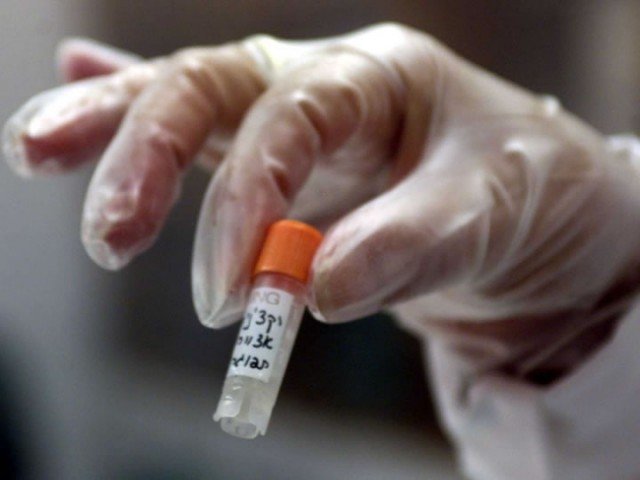
ZMapp has been credited with helping several Ebola patients recover
Liberia has recently imposed a quarantine in parts of Monrovia to try to stop the spread of the virus.
Last Thursday, police fired live rounds and tear gas during protests among residents of the city’s West Point slum.
Liberia has seen the most deaths – more than 570 – in what is now the worst Ebola outbreak in history.
Meanwhile, Japan said it was ready to allow shipments of an experimental anti-viral drug to help combat the Ebola outbreak.
It is not clear whether T-705 (or Avigan) will actually work against Ebola, and no monkey or human trials of the drug have been done.
T-705 was developed by Japan’s Toyama Chemicals company for use against new strains of influenza. It was approved by the Japanese government earlier this year.
A company spokesman says the firm believes the similarity between flu viruses and Ebola means Avigan could be effective.
Japan says it is ready to ship Avigan even without approval by the World Health Organization (WHO).
Ebola is spread between humans through direct contact with infected body fluids and several doctors and health workers have died.
It is one of the world’s deadliest diseases, with up to 90% of cases resulting in death, although in the current outbreak the rate is about 55%.
The speed and extent of the outbreak was “unprecedented”, the WHO said last week.
An estimated 2,615 people in West Africa have been infected with Ebola since March.
On Saturday, Sierra Leone’s parliament passed a new law making it a criminal offence to hide Ebola patients.
If the law is approved by the president, those caught face up to two years in prison.
[youtube MrhiHilYxv4 650]
Democratic Republic of Congo has confirmed two Ebola deaths in the country’s north-west.
They are the first reported Ebola cases outside West Africa since the outbreak there began, although it is not clear if they are directly linked to that outbreak.
So far 1,427 people have died from the Ebola virus.
The speed and extent of the outbreak has been “unprecedented”, the World Health Organization (WHO) says.
An estimated 2,615 people in West Africa have been infected with Ebola since March.
There is no known cure but some affected people have recovered after being given an experimental drug, ZMapp. However, supplies are now exhausted.
Also on Sunday, a British health worker infected with Ebola in Sierra Leone was flown back to the UK on an RAF jet. It is the first confirmed case of a Briton contracting the virus during the current outbreak.

Democratic Republic of Congo has confirmed two Ebola deaths in the country’s north-west
Several people died in the past month after contracting an unidentified fever in the Equateur region of the DR Congo.
On Sunday, Health Minister Felix Kabange Numbi said two of eight fever victims had tested positive for Ebola.
A quarantine zone would be set up in a 62-mile radius in Boende where the cases had been registered.
He said this marked the seventh outbreak in DRC. The virus was first identified here in 1976 near the Ebola River.
Felix Kabange Numbi added that further tests were being carried out.
On Saturday, Sierra Leone parliament passed a new law making it a criminal offence to hide Ebola patients.
If approved by the president, those caught face up to two years in prison.
The move came after the Ivory Coast closed its land borders to prevent the spread of Ebola on to its territory.
The country has already imposed a ban on flights to and from Sierra Leone, Liberia and Guinea.
Gabon, Senegal, Cameroon and South Africa have taken similar measures.
The WHO says travel bans do not work, and that what is needed is more doctors and officials to help trace those infected with Ebola, as well as more mobile laboratories.
The Ebola virus is spread between humans through direct contact with infected bloodily fluids. It is one of the world’s deadliest diseases, with up to 90% of cases resulting in death.
Sierra Leone’s parliament voted to pass a new amendment to its health act, imposing possible jail time for anyone caught hiding an Ebola patient.
Hiding an Ebola patient is a practice the World Health Organization (WHO) believes has contributed to a major underestimation of the current outbreak.
Those caught face up to two years in prison, the justice minister said. The measure still needs to be approved by the president.
Earlier, Ivory Coast closed its land borders to prevent the spread of the deadly Ebola virus on to its territory.
The WHO says the measures – taken by other countries as well – are counterproductive.
So far 1,427 people have died – more than in any other Ebola outbreak.
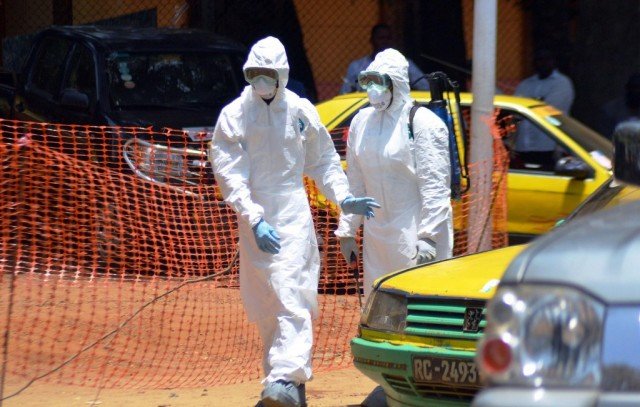
Sierra Leone’s parliament voted to pass a new amendment to its health act, imposing possible jail time for anyone caught hiding an Ebola patient
The number of cases now stands at 2,615. The speed and extent of the Ebola outbreak in West Africa are “unprecedented”, according to the WHO.
Ivory Coast, the largest economy in francophone West Africa, had previously imposed a ban on flights to and from Sierra Leone, Liberia and Guinea.
“Faced with new outbreak sites and the reactivation of old sites… the Ivorian government decides to close its land borders with sister republics Guinea and Liberia,” it said in a statement on Friday.
Gabon, Senegal, Cameroon and South Africa have taken similar measures.
The WHO says travel bans do not work, and that what is needed is more doctors and officials to help trace those infected with Ebola, as well as more mobile laboratories.
On Friday, the WHO’s Dr. Keiji Fukuda expressed concern over so-called “shadow zones”, areas which cannot be reached and where patients are not being detected.
The organization confirmed 142 new cases of the disease had been reported since 19 August, as well as 77 deaths.
Speaking at a news conference in the Liberian capital Monrovia, Dr. Keiji Fukuda said combating the disease would take “several months of hard work”.
“We haven’t seen an Ebola outbreak covering towns, rural areas so quickly and over such a wide area,” he added.
Ebola has no known cure but some affected people have recovered after being given an experimental drug, ZMapp. However, supplies are now exhausted.
Why Ebola outbreak is underestimated?
- Many families keep sick people at home, as there is no cure
- Many health centers have closed because medical staff have fled
- In Liberia, treatment centers are overwhelmed
- The existence of “shadow-zones”, areas where there are reports of Ebola but which cannot be accessed because of local resistance or lack of staff
Source: World Health Organization
Dr. Kent Brantly, one of the US aid workers who recovered from an Ebola infection, is “thrilled to be alive” as he is discharged from hospital.
Dr. Kent Brantly, 33, thanked supporters for their prayers at a news conference in Atlanta.
Nurse Nancy Writebol, 59, was discharged on August 19.
The two were brought to the US for treatment three weeks ago.
The outbreak has killed more than 1,300 people in West Africa, with many of the deaths occurring in Liberia.
“Today is a miraculous day,” said Dr. Kent Brantly, who appeared healthy if pallid as he addressed reporters on Thursday at Emory University hospital.
“I am thrilled to be alive, to be well, and to be reunited with my family. As a medical missionary, I never imagined myself in this position.”
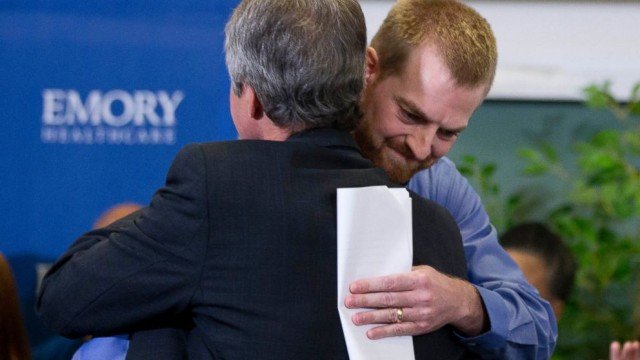
Dr. Kent Brantly contracted the Ebola virus in Liberia, where he and his family moved in October 2013 (photo AP)
Dr. Kent Brantly said Ebola “was not on the radar” when he and his family moved to Liberia in October.
After his family returned to the US as the Ebola outbreak tore through West Africa, Kent Brantly continued to treat Ebola patients and woke up on July 23 feeling “under the weather”.
Dr. Kent Brantly said he lay in bed for nine days, getting progressively sicker and weaker.
On August 1, he was flown to Atlanta for treatment at Emory unit.
Emory infectious disease specialist Dr. Bruce Ribner said after rigorous treatment and testing officials were confident Dr. Kent Brantly had recovered “and he can return to his family, his community and his life without public health concerns”.
The group for which Dr. Kent Brantly was working in Liberia, Samaritan’s Purse, said they were celebrating his recovery.
“Today I join all of our Samaritan’s Purse team around the world in giving thanks to God as we celebrate Dr. Kent Brantly’s recovery from Ebola and release from the hospital,” Franklin Graham said in a statement.
Nancy Writebol’s husband David said in a statement that she was free of the virus but was significantly weakened.
Her family decided to leave the hospital privately in order to allow her to rest and recuperate.
Meanwhile, South Africa on Thursday said non-citizens arriving from Ebola-affected areas of West Africa – the countries of Guinea, Liberia and Sierra Leone – would not be allowed into the country.
There is no cure for Ebola, one of the deadliest diseases known to humans, with a fatality rate in this outbreak of 50-60%.
But both Dr. Kent Brantly and Nancy Writebol received an experimental treatment known as ZMapp.
The drug, which has only been made in extremely limited quantities, had never been tested on humans and it remains unclear if it is responsible for their recovery.
ZMapp was also given to a Spanish priest, who died, and three Liberian health workers, who are showing signs of improvement.
[youtube ftAoelTlKLs 650]
Liberia has imposed a night-time curfew in a bid to halt the deadly Ebola outbreak.
In addition, it has quarantined an area of the capital Monrovia.
President Ellen Johnson Sirleaf said the curfew would be from 21:00 to 06:00 local time.
She said all movement would be blocked in and out of the West Point area.
Meanwhile, three doctors with Ebola who started taking experimental drug ZMapp last week showed remarkable signs of improvement, a Liberian minister said.

Liberia has imposed a night-time curfew in a bid to halt the deadly Ebola outbreak (photo AP)
Information Minister Lewis Brown said the drug was given to one Nigerian and two Liberian doctors who had caught Ebola while helping to save the lives of other victims of the virus.
In a radio broadcast, the Ellen Johnson Sirleaf blamed her government’s failure to bring Ebola under control on the public’s disregard for the advice of health workers and disrespect for official warnings.
Liberia already imposed a state of emergency earlier this month, but the number of deaths from the disease has continued to climb.
A mob attacked a health centre in West Point on Saturday, during which 17 suspected Ebola patients went missing.
Ebola has no known cure but the World Health Organization (WHO) has ruled that untested drugs can be used in light of the scale of outbreak in West Africa.
Since the beginning of the year, 1,229 people have died of the virus.
It is transmitted by direct contact with the body fluids of an infected person.
Initial flu-like symptoms can lead to external haemorrhaging from areas such as eyes and gums, and internal bleeding which can cause organ failure.
Ebola outbreak began in Guinea and has since spread to Liberia, Sierra Leone and Nigeria.
[youtube BlRU9mxRUmM 650]
Liberia’s information ministry has announced that 17 suspected Ebola patients who went missing after a Monrovia quarantine centre was attacked have been found.
The government had previously denied they were missing.
New UN figures show that 1,229 people have now died since the beginning of this year in the outbreak that has also hit Sierra Leone, Guinea and Nigeria.
The World Health Organization (WHO) says there were 84 deaths reported between August 14 and 16.
Ebola has no known cure, but the WHO has ruled that untested drugs can be used to treat patients in light of the scale of the current outbreak – the deadliest to date.
The virus is transmitted by direct contact with the body fluids of an infected person. Initial flu-like symptoms can lead to external hemorrhaging from areas such as eyes and gums, and internal bleeding which can cause organ failure.
The Liberian information minister said the missing patients were now at the newly expanded treatment unit opened over the weekend at the John F. Kennedy Memorial Medical Center in the capital, Monrovia.
He also said the health of three Liberian doctors infected with Ebola had improved after they receiving the experimental drug ZMapp.
Two US missionaries, who were flown home for treatment from Liberia, are reportedly recovering from the virus after taking doses of the same medicine.
ZMapp was also given to a 75-year-old Spanish priest who contracted Ebola in Liberia, but he died in Spain last week.
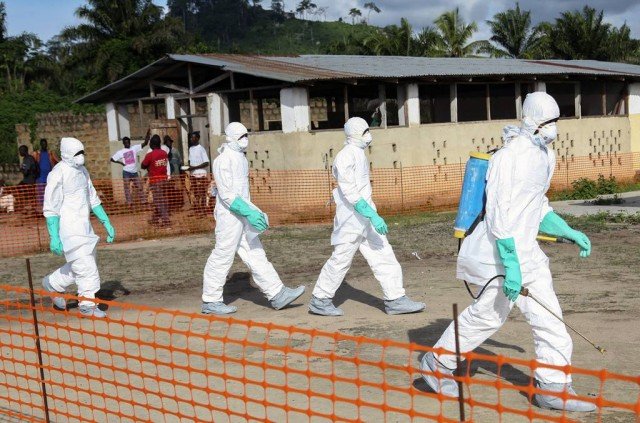
Seventeen suspected Ebola patients who went missing in Liberia after a Monrovia quarantine centre was attacked have been found
In Nigeria, which has had four fatal Ebola cases, health officials say five people have now recovered from the virus and been discharged from hospital in Lagos. Another three are still being treated.
The attack on Liberian quarantine centre, where 37 people were being held in Monrovia’s densely populated West Point township, took place on Saturday evening.
There are conflicting reports over what sparked the riot, in which medical supplies were also stolen.
Officials said the protesters were unhappy that patients were being taken there from other parts of the capital. Other reports suggested the protesters had believed Ebola was a hoax and wanted to force the centre to close.
There are also reports that the mattresses and linen being used by patients were taken during the attack.
In neighboring Sierra Leone, the agricultural minister has said the outbreak is also having a severe impact on the economy, as 66% of people were farmers and agriculture accounted for 46% of GDP and 25% of all exports.
Since the outbreak spread to Nigeria in July, when a person infected with Ebola flew from Liberia to Lagos, several airlines have stopped flights to the worst-affected countries.
Kenya’s ban on people from Guinea, Liberia and Sierra Leone entering the East African nation comes into force on Wednesday – and Cameroon has closed its land, sea and air borders with Nigeria.
Liberia has admitted that 17 suspected Ebola patients are “missing” after a quarantine unit in capital Monrovia was looted.
The government previously denied the patients are missing and tried to reassure people, saying they had been moved to another health facility.
The World Health Organization (WHO) has called for exit screenings on all travelers from affected countries.
It wants checks at airports, sea ports and major land crossings.
Several airlines have already stopped flying to Guinea, Liberia and Sierra Leone – the countries worst affected by the world’s most deadly outbreak of Ebola, which has no known cure.
The Ebola virus has killed 1,145 people this year, the WHO says.
Assistant Health Minister Tolbert Nyenswah said protesters in the West Point district attacked a quarantine centre on Saturday because they were unhappy that patients were being taken there from other parts of the capital, Monrovia.
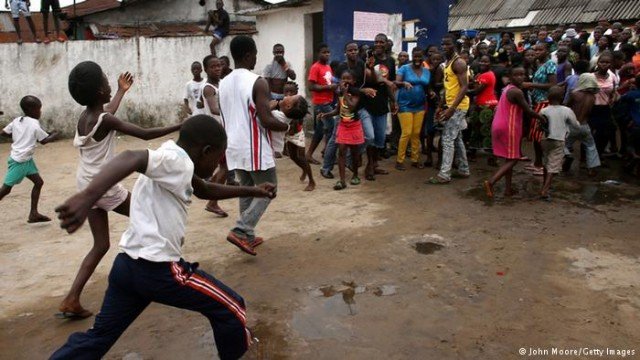
Liberia has admitted that 17 suspected Ebola patients are missing after Monrovia quarantine unit was looted (photo Getty Images)
Other reports suggested the protesters had believed Ebola was a hoax and wanted to force the centre to close.
Tolbert Nyenswah had said that all the suspected patients had been transferred to an Ebola treatment centre in the John F. Kennedy Memorial Medical Center in Monrovia.
However, on Monday, Liberia’s information minister said 17 of the 37 patients were unaccounted for.
He said the authorities were now trying to track them down but said he was confident they would return.
He said the attack on the quarantine centre was Liberia’s greatest setback since the Ebola outbreak began.
Blood-stained mattresses, bedding and medical equipment were taken from the centre.
The looting spree could spread the virus to the whole of the West Point area.
Lindis Hurum, from medical charity Medecins Sans Frontieres (MSF), says there is an urgent need for a massive public awareness campaign in Liberia.
MSF says the Ebola outbreak has had a terrible impact on Liberia’s entire healthcare system, which it says is more or less falling apart.
Many health facilities have closed, with patients as well as medical staff, too scared to turn up for fear of catching the disease.
The Ebola epidemic began in Guinea in February and has since spread to Liberia, Sierra Leone and Nigeria.
One Nigerian doctor has survived the disease and was sent home on Saturday night, said Health Minister Onyebuchi Chukwu in a statement.
Onyebuchi Chukwu said five other people infected with Ebola had almost fully recovered.
The death toll of 1,145 was announced on Friday after the WHO said 76 new deaths had been reported in the two days to August 13. There have been 2,127 cases reported in total.
[youtube cUwzkdaItTw 650]
A Liberian quarantine centre for suspected Ebola patients in capital Monrovia has been attacked and looted by protesters, police say.
The incident happened in the densely populated West Point township on Saturday evening.
At least 20 patients who were being monitored for signs of the illness have left the centre.
Officials said blood-stained bedding looted from the centre posed a serious infection risk.
The protesters were unhappy that patients were being brought in from other parts of the capital, the assistant health minister said.
Other reports suggested the protesters believed Ebola was a hoax and wanted to force the quarantine centre to close.

The Liberian quarantine centre for suspected Ebola patients in Monrovia has been attacked and looted by protesters (photo Reuters)
The quarantine centre was set up to observe suspected Ebola patients and then transfer them to a main treatment centre if they prove positive.
It is not known if those at the centre were infected with the virus, though one report suggested they had proved positive.
A senior police officer said blood-stained mattresses, beddings and medical equipment were taken from the centre.
“This is one of the stupidest things I have ever seen in my life,” he said.
He said the looting spree could threaten to spread the virus to the whole of the West Point area.
Described as a slum, there are an estimated 50,000 people in the West Point neighborhood.
The Ebola epidemic began in Guinea in February and has since spread to Liberia, Sierra Leone and Nigeria.
On Friday, the death toll rose to 1,145 after the WHO said 76 new deaths had been reported in the two days to August 13. There have been 2,127 cases reported in total.
The attack at the Monrovia centre is seen as a major setback in the struggle to halt the outbreak.
Health experts say that the key to ending the Ebola outbreak is to stop it spreading in Liberia, where ignorance about the virus is high and many people are reluctant to cooperate with medical staff.
Kenya is closing its borders to travelers from Guinea, Liberia and Sierra Leone in response to the deadly Ebola outbreak.
The health secretary said Kenyans and medical workers flying in from those states would still be allowed in.
Kenyan Airways says it will stop flights to Liberia and Sierra Leone when the ban comes in on Wednesday.
The World Health Organization (WHO) says Kenya is at “high risk” from Ebola because it is a major transport hub.
The epidemic began in Guinea in February and has since spread to Liberia, Sierra Leone and Nigeria.
On Friday, the death toll rose to 1,145 after the WHO said 76 new deaths had been reported in the two days to August 13. There have been 2,127 cases reported in total.
Earlier, Kenya’s health ministry said four suspected cases of Ebola in the country had tested negative for the virus.
The cases had involved a Liberian national and two Nigerians who had recently travelled to Kenya as well as a Zimbabwean.
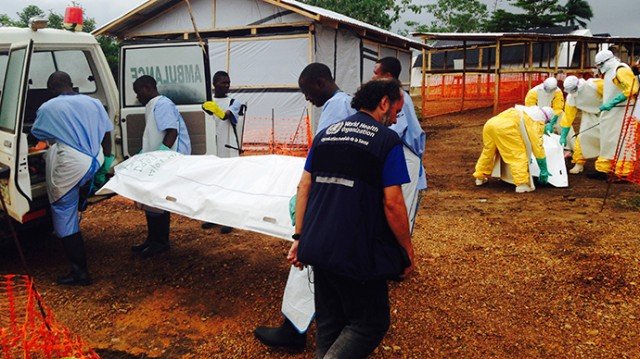
Kenya is closing its borders to travelers from Guinea, Liberia and Sierra Leone in response to the deadly Ebola outbreak
Kenya Airways said it had decided to cancel flights to Liberia and Sierra Leone’s capitals after advice from Kenya’s government.
It said all passengers booked on the suspended flights would get a full refund.
Kenya Airways said its flights to Nigeria were not affected by the suspension.
Announcing the government’s decision, Kenyan Health Minister James Macharia said it was “in the interest of public health”.
James Macharia warned that Kenyans and health workers who had returned from the three west African states would face “strict checks” and would be quarantined if necessary.
On Friday, medical charity Medecins Sans Frontieres (MSF) said the Ebola outbreak would take at least six months to bring under control.
MSF President Joanne Liu said the situation was “deteriorating faster, and moving faster, than we can respond to”.
The WHO also admitted that the scale of the outbreak appeared to be “vastly underestimated” and said “extraordinary measures” were needed to contain it.
The Ebola disease is transmitted by direct contact with the body fluids of a person who is infected.
Initial flu-like symptoms can lead to external hemorrhaging from areas such as eyes and gums, and internal bleeding which can lead to organ failure.
The WHO says the risk of transmission of Ebola during air travel remains low.
[youtube 5egWQUPH-pk 650]
According to the World Health Organization, the scale of the Ebola outbreak appears to be “vastly underestimated”, as the death toll from the disease reaches 1,069.
The WHO said its staff had seen evidence that the numbers of reported cases and deaths do not reflect the scale of the crisis.
The UN health agency said in a statement that “extraordinary measures” were needed.
The outbreak began in Guinea in February and has since spread to Liberia, Sierra Leone and Nigeria.
However, the WHO said the risk of transmission of Ebola during air travel remained low, as the disease is not airborne.
As a consequence, Kenya Airways has rejected pressure to suspend its flights to the Ebola-hit states of West Africa.
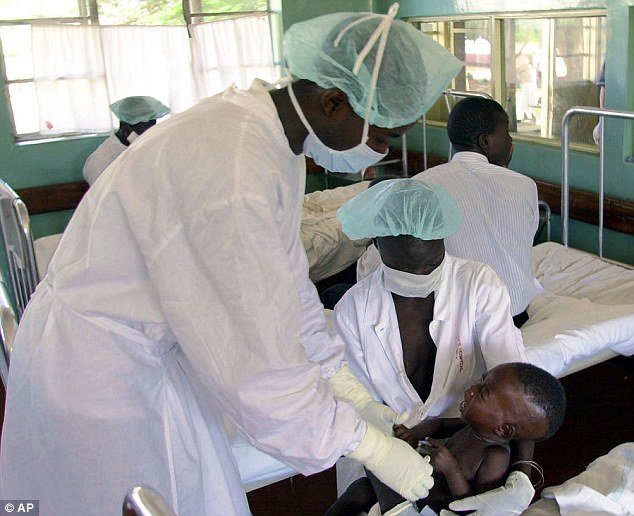
The Ebola virus death toll reaches 1,069 in West Africa (photo AP)
The WHO said the outbreak was expected to continue “for some time”.
“Staff at the outbreak sites see evidence that the numbers of reported cases and deaths vastly underestimate the magnitude of the outbreak,” its statement said.
“WHO is co-ordinating a massive scaling up of the international response.”
Part of the challenge was the fact that the outbreak was in “settings characterized by extreme poverty, dysfunctional health systems, a severe shortage of doctors and rampant fear”, the WHO added.
Two people have died in Nigeria after drinking a salt solution rumored to prevent Ebola infection.
Text messages began circulating in Nigeria towards the end of last week recommending that people drink and bath in a salt solution as a way to stop getting the virus, for which there is no cure or vaccine.
Despite the health minister scotching the rumor, many people have been admitted into hospital after drinking salt water.
Ebola is transmitted by direct contact with the body fluids of a person who is infected.
Initial flu-like symptoms can lead to external hemorrhaging from areas such as eyes and gums, and internal bleeding which can lead to organ failure.
[youtube jcsIiqr6Wlw 650]
A second senior doctor in Sierra Leone, Modupeh Cole, was confirmed dead from Ebola on Wednesday as West Africa anxiously awaited the arrival of experimental drugs to tackle the deadliest-ever outbreak of the virus.
Sierre Leone‘s chief medical officer Brima Kargbo said Modupeh Cole, a senior physician in the capital Freetown, had been “instrumental in the fight against the Ebola virus”.
Modupeh Cole’s death came only a fortnight after the country’s only virologist and leading Ebola expert, Umar Khan, succumbed to the tropical disease.
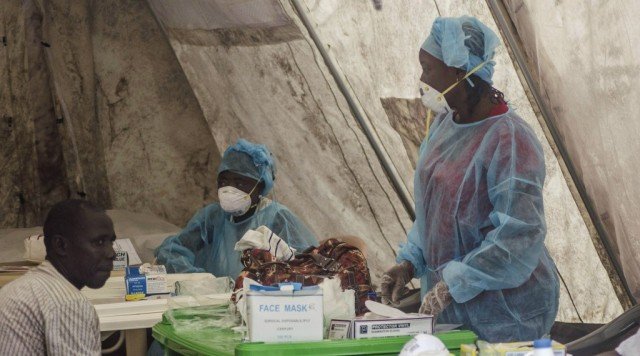
A second senior doctor in Sierra Leone was confirmed dead from Ebola (photo Reuters)
Another of the worst-hit countries, Liberia, is scrambling to save two of its own infected doctors and hopes an experimental serum from the US will arrive in time.
The presidency said Tuesday it had received approval from the FDA for the use of a barely-tested ZMapp treatment that has shown positive early results.
The two infected doctors have given their written consent to try the drug, which will be delivered to the country within 48 hours. A third doctor has already died from the virus.
The World Health Organization (WHO) declared Tuesday it was ethical to try largely untested treatments “in the special circumstances of this Ebola outbreak”.
The company behind ZMapp said it had sent all its available supplies to the region following an outcry over the fact it had so far only been used on Westerners, but supplies are extremely limited.
[youtube kW0Og_AkuMg 650]
Canada will donate up to 1,000 doses of an experimental Ebola vaccine to help battle the disease’s outbreak in West Africa.
The announcement comes after the World Health Organization (WHO) said it was ethical to use untested drugs on Ebola patients.
However, experts say supplies of both the vaccine, and experimental drug ZMapp are limited and it could take months to develop more supplies.
More than 1,000 people have been killed by the current outbreak.
Canada says between 800 and 1,000 doses of the vaccine, which has only been tested on animals, will be donated to the WHO for use in West Africa.
However, it will keep a small portion of the vaccine for research, and in case it is needed in Canada.
The current outbreak has infected people in Guinea, Sierra Leone, Liberia and Nigeria.
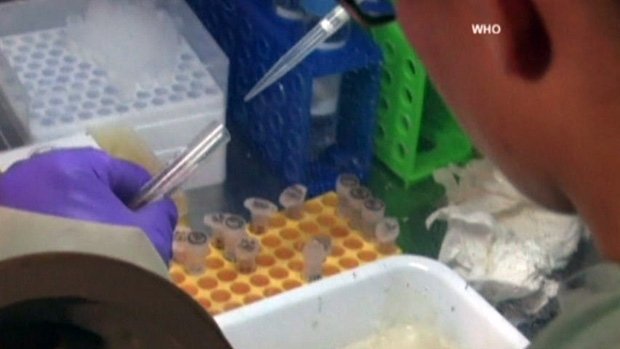
Canada will donate up to 1,000 doses of an experimental Ebola vaccine to help battle the disease’s outbreak in West Africa (photo WHO)
Dr. Gregory Taylor, deputy head of Canada’s Public Health Agency, said he saw the vaccines as a “global resource”.
He said he had been advised that it would make sense for health care workers to be given the vaccine, given their increased risk of contracting the disease.
Even if Canada releases most of its existing doses, experts warn it could take four to six months to make a quantity large enough to have any real impact at preventing the illness.
On Tuesday, the WHO said that in light of scale of the outbreak and high number of deaths, it was “ethical to offer unproven interventions with as yet unknown efficacy and adverse effects, as potential treatment or prevention.”
Last week the WHO declared the Ebola outbreak was a global health emergency.
Liberia says it is getting an experimental drug, ZMapp, after requests to the US government.
However, the WHO said there were only 12 doses.
ZMapp maker Mapp Biopharmaceutical said on Tuesday: “The available supply of ZMapp has been exhausted. We have complied with every request for ZMapp that had the necessary legal/regulatory authorization.
“Drug has been provided at no cost in all cases.”
ZMapp has been used on two US aid workers, Dr. Kent Brantly and Nancy Writebol, who have shown signs of improvement, although it is not certain what role the medication played in this.
A Roman Catholic priest, infected with Ebola in Liberia, who died after returning home to Spain is also thought to have been given the drug.
Ebola’s initial flu-like symptoms can lead to external hemorrhaging from areas like eyes and gums, and internal bleeding which can lead to organ failure. Patients have a better chance of survival if they receive early treatment.
[youtube 11B1NPvvYnE 650]
Liberia will receive ZMapp, an untested experimental Ebola drug, to treat infected patients, the government announces.
The move came after a request to the US from Liberian President Ellen Johnson Sirleaf, the government said.
The news came as medical ethics specialists met in Geneva to explore the use of such new treatments.
The World Health Organization (WHO), which is hosting the meeting, says some 1,013 have died from Ebola in West Africa.
US government officials said their role had been to put Liberian officials in contact with ZMapp maker Mapp Biopharmaceutical.
The pharmaceutical company said its supply of the drug was exhausted after its supplies were sent to West Africa, AFP news agency reported.
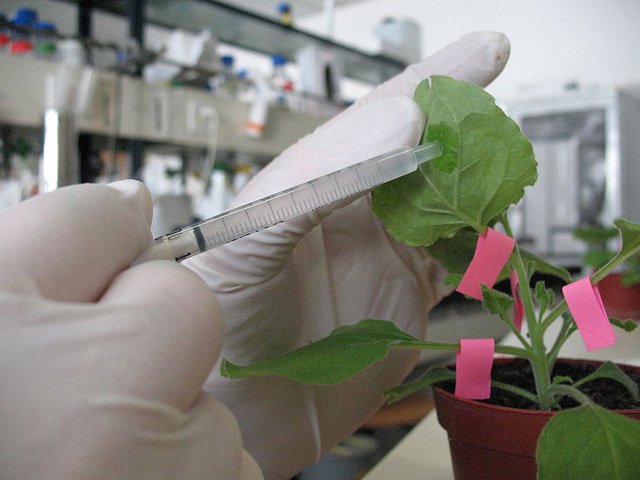
Liberia will receive an untested experimental drug, Zmapp, to treat people infected with Ebola
The drug was “provided at no cost in all cases,” the company added.
ZMapp has been used in the US on two aid workers who have shown signs of improvement, and a Roman Catholic priest, infected with Ebola in Liberia, who is currently being treated in a hospital in Madrid.
However, the drug has only been tested on monkeys and has not been yet evaluatd for safety in humans.
The WHO will announce the outcome of its emergency meeting on the role of experimental drugs on Tuesday.
Earlier, Ivory Coast announced it had banned all passenger flights from the three countries hit the worst by the spread of Ebola: Guinea, Liberia and Sierra Leone.
It is the second country, after Saudi Arabia, to impose such a ban in a bid to prevent the spread of the deadly virus.
There is no cure for Ebola, which has infected at least 1,779 people since the outbreak was first reported in Guinea in February.
Ebola’s initial flu-like symptoms can lead to external haemorrhaging from areas like eyes and gums, and internal bleeding which can lead to organ failure. Patients have a better chance of survival if they receive early treatment.
Meanwhile, China has sent medical supplies worth 30 million yuan ($4.9 million) to Liberia, Sierra Leone and Guinea to help fight against the disease.
Separately, the Chinese ambassador to Sierra Leone said on Monday that eight Chinese medical workers who had been treating Ebola patients had been placed in quarantine for the past two weeks in the capital.
Nigeria, Africa’s most populous country, confirmed a 10th case of Ebola on August 11.
[youtube Zwl71kviptk 650]
Clinical trials of a preventative vaccine for the Ebola virus made by pharmaceutical company GlaxoSmithKline may begin next month and made available by 2015, the WHO said on Saturday.
“We are targeting September for the start of clinical trials, first in the United States and certainly in African countries, since that’s where we have the cases,” Jean-Marie Okwo Bele, the WHO’s head of vaccines and immunization, told French radio.
Jean-Marie Okwo Bele said he was optimistic about making the vaccine commercially available.
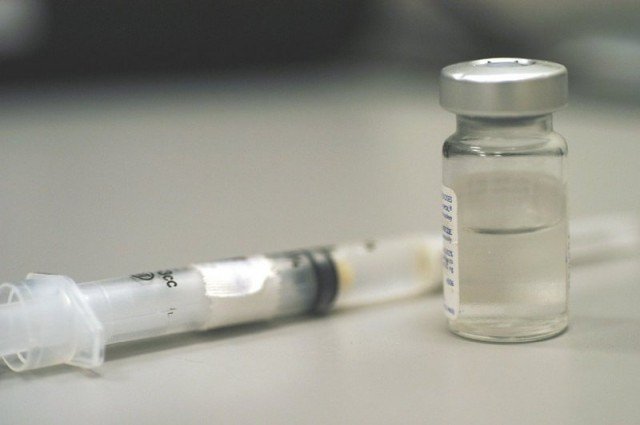
Clinical trials of a preventative vaccine for the Ebola virus made by GSK may begin next month and made available by 2015
“We think that if we start in September, we could already have results by the end of the year.
“And since this is an emergency, we can put emergency procedures in place … so that we can have a vaccine available by 2015.”
There is currently no available cure or vaccine for Ebola, a virus that causes severe fever and, in the worst cases, unstoppable bleeding.
It has claimed close to 1,000 lives in the latest epidemic to spread across West Africa this year. Fatality rates can approach 90 percent, although the latest outbreak has killed around 55 to 60 percent of those infected.
Several vaccines are being tested, and a treatment made by San Diego-based Mapp Biopharmaceutical, ZMapp, has shown promising results on monkeys and may have been effective in treating two Americans recently infected in Africa.
[youtube Bv8szpKXCQs 650]
Guinea has decided to close its borders with Liberia and Sierra Leone to contain the spread of Ebola, which has killed 959 people in the three countries.
The latest Ebola outbreak is thought to have begun in Guinea, but Liberia and Sierra Leone are currently facing the highest frequency of new cases.
The World Health Organization (WHO) said on Friday the spread of the virus was a global health emergency.
The Ebola virus is transmitted between humans through bodily fluids.
Animals such as fruit bats carry the virus, which can be transmitted to humans through contact with blood or consumption of bushmeat.
In recent weeks, countries around the world have advised their citizens not to travel to the affected countries.
The infections have spread to Nigeria, which has recorded two deaths and several more cases.
The total number of cases in the current outbreak stands at 1,779, the WHO said on Friday.
The most recent figures from August 5 and 6 showed 68 new cases and 29 deaths.
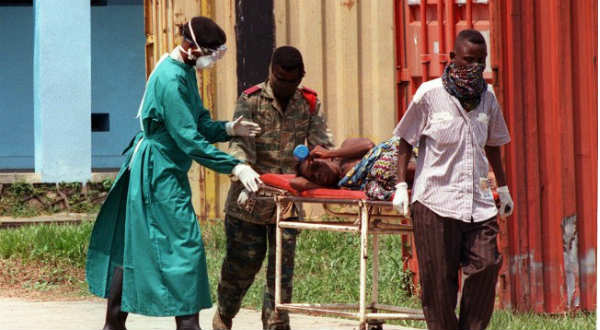
Guinea has decided to close its borders with Liberia and Sierra Leone to contain the spread of Ebola
They included 26 new cases in Sierra Leone and 38 in Liberia, but no new cases in Guinea, where the outbreak began.
Guinea said it was closing its borders in order to stop people from entering the country.
“We have provisionally closed the frontier between Guinea and Sierra Leone because of all the news that we have received from there recently,” Health Minister Remy Lamah told a news conference.
Remy Lamah added that Guinea had also closed its border with Liberia.
Guinea, Sierra Leone and Liberia have already declared varying levels of emergency over the spread of the virus.
The most intense outbreak in Guinea was located in the region along the border with Liberia and Sierra Leone.
The WHO had said the worst-affected area, which straddles the borders between the three countries, would be isolated and treated as a “unified zone”.
It is not clear what effect Guinea’s announcement will have on the strategy.
The WHO said a co-ordinated response was essential.
The Ebola virus was first discovered in the Democratic Republic of Congo in 1976.
Experts say the current outbreak is unusual because it started in Guinea, which has never before been affected, and is spreading to urban areas.
[youtube 4FAlu6u9oH0 650]
Nigeria’s President Goodluck Jonathan has declared the outbreak of Ebola “a national emergency” and approved more than $11 million to help contain it.
The move comes after the World Health Organization (WHO) said the spread of the virus in West Africa was an international health emergency.
WHO says 961 people have died from Ebola in West Africa this year, two of them in Nigeria.
The total number of cases stands at 1,779, the UN health agency said.
In a statement, President Goodluck Jonathan called on Nigerians to report any suspected Ebola cases to the nearest medical authorities.
Goodluck Jonathan also urged the public not to spread “false information about Ebola which can lead to mass hysteria”.
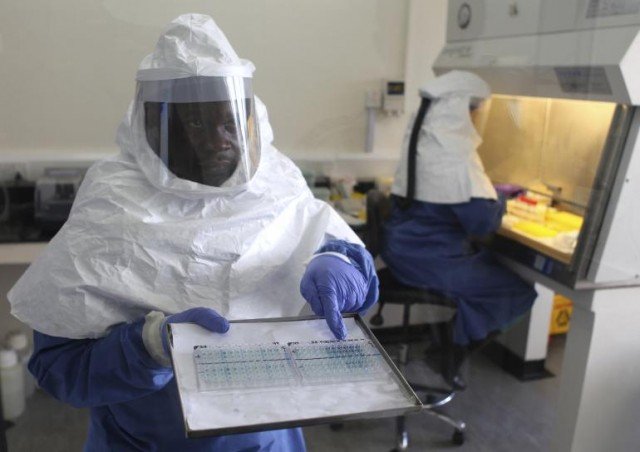
Nigeria has declared the outbreak of Ebola a national emergency
Nigeria became the fourth West African country involved in the outbreak when a dual US-Liberian citizen infected with Ebola arrived in Lagos after flying from Liberia via Togo on 20 July.
He died five days later and eight people who came into contact with him were also later diagnosed with Ebola. One of them, a nurse, died on Tuesday.
Nigeria’s state oil company said on Friday it had shut down one of its clinics in Lagos following a suspected case.
US health authorities said on Friday they were sending extra personnel and resources to Nigeria.
“We are starting to ramp up our staffing in Lagos,” US Centers for Disease Control (CDC) and Prevention spokesman Tom Skinner told AFP news agency.
“We are really concerned about Lagos and the potential for spread there, given the fact that Lagos – and Nigeria for that matter – has never seen Ebola.”
International companies are also taking protective measures and the world’s largest steelmaker, ArcelorMittal, says it has begun evacuating some workers at its iron ore mines in Liberia.
Guinea, Sierra Leone and Liberia have already declared national emergencies over the spread of the virus.
WHO said on Friday that 68 new cases and 29 deaths were reported over the course of two days this week.
They included 26 new cases in Sierra Leone and 38 in Liberia, but no new cases in Guinea, where the outbreak began.
The agency said a co-ordinated response was essential to reverse the spread of the virus.
“The possible consequences of further international spread are particularly serious in view of the virulence of the virus,” WHO said after a meeting on Friday.
The Ebola virus was first discovered in the Democratic Republic of Congo in 1976. Experts say this outbreak is unusual because it started in Guinea, which has never before been affected, and is spreading to urban areas.
Two US citizens infected with Ebola while working in West Africa are currently being treated at a hospital in Atlanta, Georgia. Both have been treated with an experimental drug.
[youtube 9PEHuRbjGVc 650]
The World Health Organization has declared the Ebola outbreak an international health emergency.
WHO officials said a coordinated international response was essential to stop and reverse the spread of the virus.
The announcement came after experts convened a two-day emergency meeting in Switzerland.
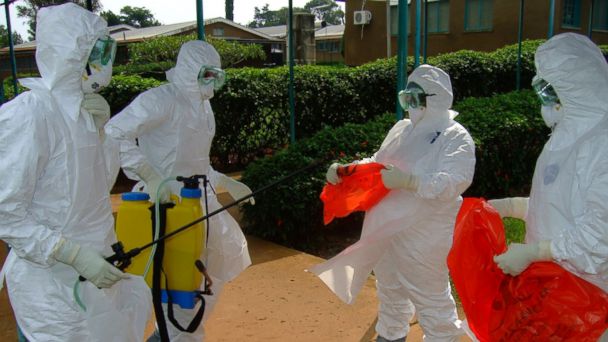
The WHO has declared the spread of Ebola in West Africa an international health emergency (photo Getty Images)
So far more than 960 people have died from Ebola in West Africa this year.
The WHO said the outbreak was an “extraordinary event”.
“The possible consequences of further international spread are particularly serious in view of the virulence of the virus,” the UN health agency said in a statement.
More than 1,700 cases of Ebola have been reported in Guinea, Liberia, Nigeria and Sierra Leone.
WHO director-general Dr. Margaret Chan appealed for help for the countries hit by the “most complex outbreak in the four decades of this disease”.
Dr. Margaret Chan said there would be no general ban on international travel or trade.
[youtube LTepwDL5ar4 650]
[youtube U67NUm-CYXw 650]
[youtube ITW1beblwXc 650]
A New York man who was admitted to hospital with a high fever and stomach problems after travelling through West Africa has tested negative for Ebola.
The patient in New York had been isolated shortly after arriving at Mount Sinai hospital on Monday.
An outbreak in West Africa has killed more than 900 people and a state of emergency has been declared in Liberia.
The US infectious disease agency is now operating at its highest emergency response in order to free up resources.
Ebola is one of the deadliest diseases known to humans, with a fatality rate in this outbreak of between 50% and 60%.
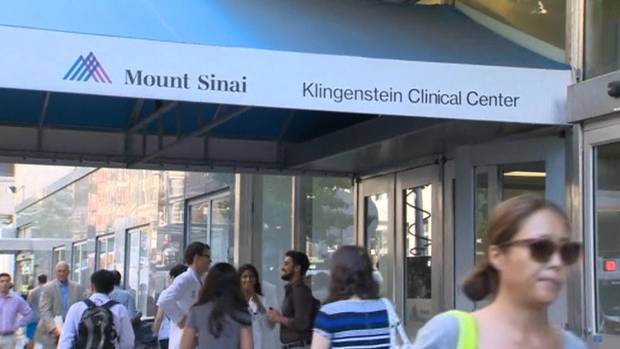
The Ebola suspected patient has been isolated shortly after arriving at Mount Sinai hospital
It is spread through contact with the bodily fluids of Ebola patients showing symptoms.
Two other Americans infected with Ebola were flown this week from Liberia to a hospital in Atlanta to receive treatment.
They are reportedly improving after receiving an experimental drug called ZMapp, produced by a firm in San Diego, but it is unclear if the drug is responsible for their improving health.
At least one country involved in the outbreak is interested in the drug.
Nigeria’s health minister, Onyenbuchi Chukwu, said at a news conference that he had asked US health officials about access. Nigeria has seen seven confirmed cases.
Officials said the manufacturer would have to agree. A spokesman for the Centers for Disease Control and Prevention (CDC) said director Dr. Tom Frieden “conveyed there are virtually no doses available”.
Dr. Tom Frieden was expected to testify in front of Congress about the outbreak on Thursday.
The treatment, tested only in animals, boosts the immune system’s ability to fight off Ebola through antibodies made by lab animals exposed to elements of the virus.
The World Health Organization (WHO) has planned to convene a panel of medical ethicists next week to discuss the ramifications of using an untested drug.
In a statement, it said the use of ZMapp “has raised questions about whether medicine that has never been tested and shown to be safe in people should be used in the outbreak and, given the extremely limited amount of medicine available, if it is used, who should receive it”.
Some public health officials were wary of ramping up production of the drug at the expense of traditional isolation and testing measures.
Peter Piot, who co-discovered the virus in 1976, and two other Ebola experts, urged the drug be made more widely available.
The FDA has separately given the US defense department an emergency authorization to use an Ebola diagnostic test overseas.
It will be used in labs designated by the defense department to respond to the Ebola outbreak.
[youtube PMEdAYrU6AE 650]
 Prev1...345Next
Prev1...345Next  Page 4 of 5
Page 4 of 5

























